Traveling the road is a way of life. Nowadays, in China, a lot of people aren't content to experience a new place by cursory tour. More and more people are taking the road less traveled, seeking a sense of freedom in the uninhibited, open journey.
American author, Jack Kerouac, described the life and predicaments faced by backpackers traveling the world in his novel, "The Dharma Bums." These globe-trotters climb high mountains to pray, amuse local kids, are friendly with the elderly and make girls comfortable. They are all "Zen lunatics," writing strange poems on a whim and bringing a perpetual sense of freedom to wherever they go.
Set foot in Tongren County in the Tibetan Autonomous Prefecture of Huangnan, Qinghai province, and you are welcomed by a wide stretch of blue sky, bright sunshine and fresh air with an earthy aroma.
I met Zainpala while traveling on the road in Rebgong. He is a photographer and teacher from Shanghai, though with his large stature, innocent smile, sun-baked skin and Qinghai accent, he looked a far cry from the typical Shanghai resident.
Zainpala is no stranger to Rebgong. He says that the area evokes happiness within him, initiating an interior monologue that can't be felt in any other place. There is another aspect of Rebgong that Zainpala points out as having a profound impact on him.
"I am moved mostly by the smiles of the people here. We don't see this kind of smile in any place in big cities. When they smile, they show their white teeth and simplicity on their faces. I think this smile comes from his or her soul."
Zainpala said that he came to Rebgong because he has predestined relationship with the Buddha. Twenty-five years ago, he came to Qinghai province to take photos. As he was waling, a local Tibetan Buddha, who later became his master, passed by and asked him, "Do you want to become a monk?" Having accepted the suggestion, he comes to call on the master every year. Such unique experiences are only met in Rebgong, traveling on the road.
Located in the Tibetan Autonomous Prefecture of Huangnan in Qinghai province, Tongren County, also known as "Rebgong," which literally means "golden valley," named as a place where dreams come true. It has rich cultural tourism resources and the most concentrated National Intangible Cultural Heritages in Qinghai. On the side of the Yellow River and the junction where the Qinghai-Tibet Plateau and Loess Plateau meet, the Rebgong culture thrives, displaying customs that combine animal husbandry with agriculture. While folk art and Tibetan Buddhist religious customs abound, there is a charming natural environment with rolling hills, lush valleys and various grasslands and forests.
Rebgong is home to the legendary Thangka painting. Thangka is Tibetan for a kind of scroll panting on colored satin. Created in the Tubo period, 1300 years ago, it is widely utilized in temples to show the local religion, custom and culture. For the majority of Tibetan nomadic tribes living near the grasslands, the scrolled Thangka acted as a portable temple and totem to pray and worship.
 |

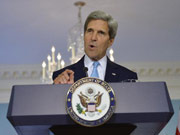 Kerry says U.S. to make own decision on attack on Syria
Kerry says U.S. to make own decision on attack on Syria China's weekly story (2013.8.24 - 8.30)
China's weekly story (2013.8.24 - 8.30) Highlights of MAKS 2013 Int'l Aviation and Space Show
Highlights of MAKS 2013 Int'l Aviation and Space Show 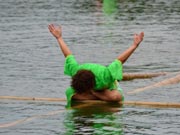 Stunt performance on floating bamboo stick
Stunt performance on floating bamboo stick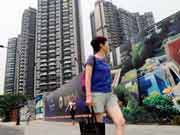 Home prices keep rising in August
Home prices keep rising in August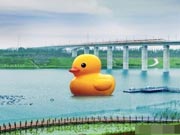 18-meter-high Rubber Duck ready to meet Beijingers
18-meter-high Rubber Duck ready to meet Beijingers Reveal the South Korean beauty production line
Reveal the South Korean beauty production line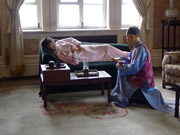 Puppet Manchurian Palace Museum in China's Jilin
Puppet Manchurian Palace Museum in China's Jilin
Day|Week|Month